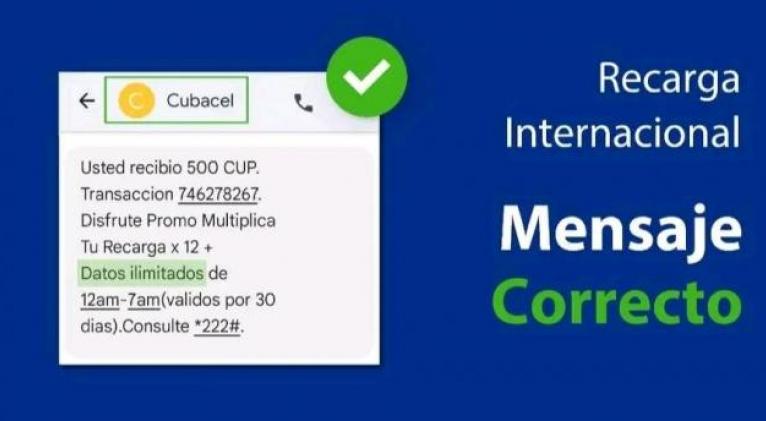How Can the Fraud in Telecommunications Service Be Explained?
especiales

Why is Etecsa talking about fraud? Why is it talking about millions in lost revenue? What is the real magnitude of this damage, and what specifically does it impact? Who is involved? Can we, the company's customers, do anything to reduce these fraudulent acts?
These and other questions were answered yesterday by the program Hacemos Cuba, broadcast on Canal Caribe.
Colonel Marcos Yobany Rodríguez González, deputy head of the Specialized Body for Fighting Crimes against the Economy of the Ministry of the Interior, explained that the fraud involving Etecsa's international top-ups is due to the coordination of a group of actors in Cuba and abroad who, through various technological mechanisms, parallel to those established or contracted by Etecsa with its international distributors, illegally market domestic top-ups abroad, pretending to be international top-ups.
He explained that there are different actors involved; "First, external platform operators, who are those who simulate promotions or offers that could be economically more attractive than those officially offered by Etecsa abroad, through the digital spaces, towards the clients which Etecsa usually uses in these spaces.
"These are platform operators that interconnect with other individuals and legal entities, who are the ones who use and retain these foreign currency funds abroad for their own personal use," explained Colonel Rodríguez González.
He also pointed out that other figures exist in Cuba: "The first is the fundraiser, who provides the recharge recipients with cash or bank transfers—in local currency—to order the crediting of domestic recharges to the users designated as part of this process and compensation.
"What was credited to the people were balances as part of the domestic recharge process," he clarified.
When asked who does this within the country, the DTI colonel explained that individuals licensed as ETECSA telecommunications agents have participated indiscriminately; "This is an important point because it provides facilities for systematically making domestic top-ups without the limitation that other people have of making two top-ups per day. Also, as part of the processing and technological application they employ, they employ hundreds of people who systematically make two top-ups per day in order to credit these funds to the users that people abroad pay their counterparts."
In short, the person receives the top-up from their relative abroad, but not as an international top-up, with the resource benefits that the company can provide at that time, but rather as just another domestic top-up.
IS THIS FRAUD A CRIME?
José Luis Reyes Blanco, chief prosecutor of the Criminal Proceedings Directorate of the Attorney General's Office, said that the recipients of the top-ups, that is, the beneficiaries, are considered victims of the process. However, the entire framework surrounding the sale of the top-up "is committing a crime."
The beneficiary is receiving an incomplete service, "since they are being deceived." The relative is providing him with a foreign currency top-up, and what he’s receiving is a national currency top-up from a criminal organization that has been created and that is causing harm," he noted.
This harm, he noted, is primarily directed at the customer, but also at the company and the State; in other words, there are several approaches.
Regarding the investigations into these criminal acts, Colonel Rodríguez González specified that, recently, an investigation has been underway, and preliminary public actions have been taken, into a criminal organization whose operations are worth millions and produce adverse effects worth millions in foreign currency that the company stops receiving as a result of these activities.
In this regard, the Prosecutor noted that, based on the ruling of the People's Supreme Court, and given the impacts already detailed, these acts may constitute the crime of sabotage.
But I insist, he clarified, that it's not the person who receives the top-up, but rather all the people who actively participate in the collection and diversion of foreign currency by committing fraud during the top-up process.
HOW DO I KNOW IF I'M RECEIVING THE CORRECT TOP-UP OR NOT?
Michel Rodríguez Averoff, Director of Cybersecurity at Etecsa, explained that the incorrect message is one that reflects the purchase of a combined national plan; for example, one that is divided into data, minutes, and messages, and many people received this type of combined plan accreditation as a supposed international top-up.
On the other hand, the international top-up message is structured with the network resources granted for the purchase of the package, but it’s given an easily identifiable bonus, because it’s unlimited data from 12:00 a.m. to 7:00 a.m., or in other packages that have included unlimited WhatsApp.
The Etecsa executive reported that the entity currently has 16 official distributors contracted to handle international top-ups.
Interested users can go to the Etecsa websites and select any of the links to access those distributors.
SERIOUS SERVICE IMPACT
Regarding the classification of these actions as a crime of sabotage, the Head of the Criminal Proceedings Directorate of the Prosecutor's Office stated that this is in line with the recent ruling of the People's Supreme Court, in compliance with its power to standardize the interpretation and application of laws—enshrined in the Constitution and in the Courts Law itself—which helps all operators of the Justice System interpret them.
The telecommunications system is everywhere, so affecting it means affecting all spheres of society, he acknowledged.
Therefore, he argued, when a group of people raise money, misappropriate funds intended to promote the development of this activity by an entity, in this case Etecsa. This money is intended for service improvements, to raise quality, and reduce failures. This is undoubtedly affecting the service, and is part of the logic established by the recent Supreme Court ruling.
The Prosecutor's Office noted that the crime of sabotage is serious, and its penalties are high, as they are commensurate with the harmful nature of these acts.
Both the Prosecutor's Office and the Ministry of the Interior agreed that these acts are accompanied by other crimes such as fraud and illegal trafficking of national currency and foreign exchange.
Translated by Amilkal Labañino / CubaSi Translation Staff














Add new comment